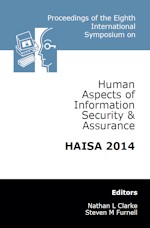In 2014, we launched our open-access repository which offers full text access to conference proceedings from many of our events including the INC and HAISA series. These papers are free to access and distribute (subject to citing the source).
» Openaccess proceedings » Eighth International Symposium on Human Aspects of Information Security & Assurance (HAISA 2014)
 | Eighth International Symposium on Human Aspects of Information Security & Assurance (HAISA 2014) |
Title: Users can’t be fooled – The role of existing vs. fictitious third party web assurance seals on websites
Author(s): Nina Bär, Josef Krems
Reference: pp198-205
Keywords: Web assurance seals, user’s trust, user behaviour
Abstract: For secure online behaviour, individual attitudes like the users’ trust in websites are just as important as technical security means. One possibility to accomplish trust in the web environment is the use of third party web assurance seals. Still, the effects of such security indicators are discussed controversially. Previous studies indicated that online users are vulnerable to visual deception; therefore might misleadingly place trust in insecure websites. In order to check the effectiveness of existing web assurance seals in comparison to fictitious graphical elements that could fool users, an online study (N = 131) was conducted. The participants had to estimate the trustworthiness of four different German websites which were equipped with either typical existing, fictitious or no web assurance seals. Results show that the existing seals provoked the highest level of users’ trust while the fictitious seals did not yield any significant trust-promoting effects compared to the control group. However, qualitative feedback indicated that the users’ knowledge about web assurance seals is rather unspecific which makes them vulnerable to manipulation.
Download count: 1702
How to get this paper:


PDF copy of this paper is free to download. You may distribute this copy providing you cite this page as the source.
